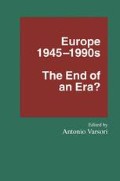Abstract
Is German unification the beginning of a new Sonderweg, a new ‘special way’? If we attribute to this term the historically pejorative and suspect meaning with which many historians and commentators have used it, then the answer is ‘no’: united Germany is not setting off on a new Sonderweg. Indeed, we may reverse the terms of the question by stating that the Germany of the 1990s has now definitely left behind the anomalous situation forcibly imposed on her when she was divided after World War II; a situation, in fact, to which she, or at least the Bundesrepublik, adapted remarkably well. This does not, however, alter the fact that Germany’s return to normality puts her in a special position. It is this paradox that I shall seek to analyze in this chapter.
Preview
Unable to display preview. Download preview PDF.
Editor information
Editors and Affiliations
Copyright information
© 1995 Palgrave Macmillan, a division of Macmillan Publishers Limited
About this chapter
Cite this chapter
Rusconi, G.E. (1995). Unified Germany: A New Sonderweg?. In: Varsori, A. (eds) Europe 1945–1990s. Southampton Studies in International Policy. Palgrave Macmillan, London. https://doi.org/10.1007/978-1-349-23689-3_27
Download citation
DOI: https://doi.org/10.1007/978-1-349-23689-3_27
Publisher Name: Palgrave Macmillan, London
Print ISBN: 978-1-349-23691-6
Online ISBN: 978-1-349-23689-3
eBook Packages: Palgrave Political & Intern. Studies CollectionPolitical Science and International Studies (R0)

